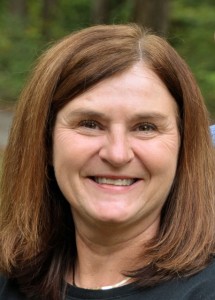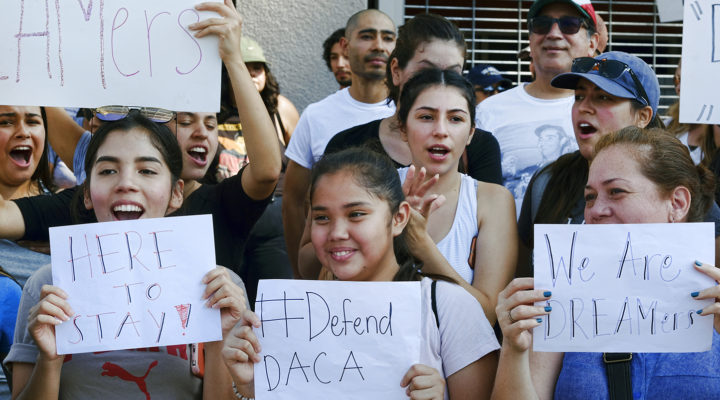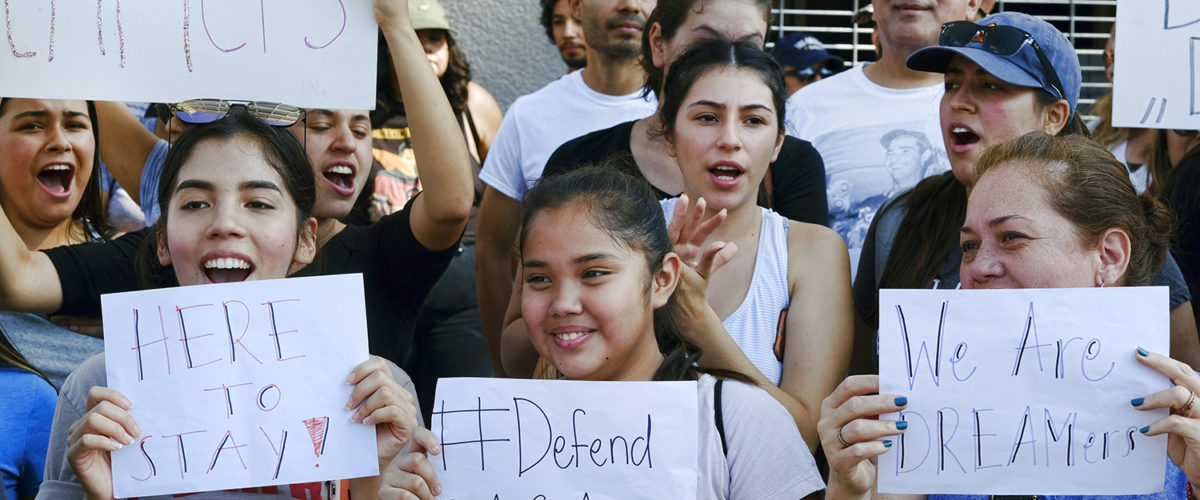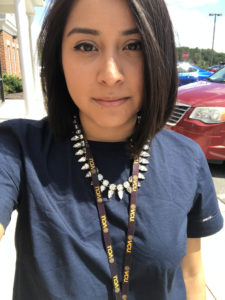Yerendi Roblero was 6 months old when her parents took the family across the U.S. border from their native Guatemala.
“I pretty much grew up here, ” said Roblero, 21, of Fredericksburg, Va.
It’s why President Trump’s decision to end special protections for undocumented immigrants living in the United States since childhood concerns her and many others.
She contemplates what it would be like to be deported to a country she hasn’t seen since infancy.
“I don’t know my country. I’m nervous,” she said. “I would be happy to see my family, but it’s a family I don’t know.”
She imagines what it would be like to cook and eat differently, since her family in Guatemala lives in a rural village without the amenities she’s grown up with.
“It will take getting used to … the way they wash their clothes — they don’t have washing machines. They go down to the river.”
Trump this week said he was ending the Deferred Action for Childhood Arrivals program, which President Obama created by executive order in 2012.
Also known as DACA, the program provides immunity from deportation for some 800,000 immigrants raised and educated in the U.S. Through it, they are eligible for work permits. Participants must re-apply for the status every two years.
To be eligible, immigrants had to arrive in the United States before their 16th birthday and must have lived here continuously since June 15, 2007.
No one with a felony conviction, a DUI or three or more misdemeanors is eligible for DACA status.
But Trump has since muddied the waters by declaring he would revisit the topic if Congress doesn’t pass legislation codifying provisions similar to DACA.
‘Real people affected’
Others are urging Congress to act quickly to maintain the protections of this group of immigrants.
Religious groups, including the Cooperative Baptist Fellowship, have condemned Trump’s decision to abolish the Obama-era program.
CBF Executive Coordinator Suzii Paynter noted in a statement that the program has been a model for a wider immigration program as its participants speak English, hold down jobs and contribute to their communities.
DACA, she said, “has exceeded every criterion that we’ve ever looked at for successful immigration.”
An advocate for immigrants said the president’s decision is wakeup call for churches, too.
 “These are real people affected by this stuff,” said Sue Smith, co-founder of LUCHA Ministries, a Fredericksburg organization that helps Latinos adjust to the challenges of life in the U.S. She and her husband Greg are CBF field personnel.
“These are real people affected by this stuff,” said Sue Smith, co-founder of LUCHA Ministries, a Fredericksburg organization that helps Latinos adjust to the challenges of life in the U.S. She and her husband Greg are CBF field personnel.
“For a lot of us advocates, we are disappointed but we see this as a real opportunity to get legislation passed,” Smith said.
And that’s where people of faith can be helpful.
“It’s time for us as a church to get off the fence and do something,” she said. “We need to encourage people to call Congress.”
The legislation Democrats are pushing is known as the Dream Act, which prompted the designation “dreamers” applied to the young immigrants. It offers them a path to legalization.
It’s vital because DACA has been instrumental in saving immigrants who grew up in America from falling hopelessly into poverty and isolation.
Before the program, Smith said she routinely saw young immigrants, as they neared high school graduation, denied opportunities to work and attend college.
“These kids were starting to realize late in high school they couldn’t take the SAT, they were excluded from driver’s ed classes,” Smith said. “As the exclusions became more evident, these kids became more depressed.”
When Obama created DACA, its participants could get jobs that didn’t pay under-the-table wages, and they could continue their education.
“It did wonders for their spirit and their ability to contribute to their communities,” Smith said.
And while fear has crept back into their lives with the president’s decision, some immigrants maintain hope.
Painful lessons
“I’m not going to say that I am not worried, but I have to live by what’s going on right now,” said Hector Camacho, 25, of Fredericksburg.
Camacho was 11 when his family, including his 5-year-old brother, came to the United States from Mexico.
A talented soccer player, it wasn’t until he was in his teens and he was recruited by a prestigious travel team that he began to realize the limitations of his immigration status. The program required more identification than he could produce.
It hit home harder later in his teens.
“When it was time to get a driver’s license and I couldn’t, I started realizing that bigger struggles were coming my way,” he said.
One of those was having to pay more than twice the tuition for community college than his peers because he had to pay out-of-state rates.
“It was a huge relief when I finally got DACA,” Camacho said. “I saw how smooth life could be.”
The possibility that life could again become a series of road blocks — and deportations — isn’t ruining Camacho’s attitude.
“It’s OK to have fear in what’s coming, but don’t let that affect your today,” he said. “Just don’t give up.”
‘Give back to those kids’
Camacho currently works as a medical interpreter for a community health care center. It wasn’t the job he originally envisioned but it’s turned out to be fulfilling because he gets to help so many people — often by connecting them with Smith and LUCHA Ministries.
“I realize that people are going through a lot more than I am. When I see them here they talk about much more than their medical problems,” he said.
Like Camacho, Roblero grew up in a home that received life-giving assistance from Smith and her ministry.
“Miss Sue helped us with food and school and with school supplies and with interpreting for medical visits,” Roblero said. “She is like a mom for a whole group of people.”
Smith’s example inspired Roblero to participate in CBF’s Student.Go program, where she mentored children and youth and provided transportation for moms who cannot drive.
Smith said DACA participants generally do a lot to give back to the communities in which they live. Roblero said it’s simply the obvious thing to do.
“I was helped and I got a chance to give back to those kids.”



